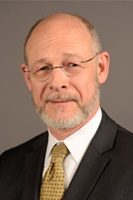Renowned Mass. Eye and Ear balance expert Dr. Steven Rauch, MD, explains what balance is, why it is miraculous, and what people can do to avoid age-related declines.
A person’s sense of balance is “miraculous,” according to Dr. Steven D. Rauch, medical director of the Balance and Vestibular Center at Massachusetts Eye and Ear. Balance, he explains, is different from other senses like sight, sound and smell, which come from one single input (eyes, ears, and nose, respectively). Instead, balance is a complex interplay of sensory inputs from across the body that get processed in the brain.
So, what happens when these processes are not aligned and a person’s balance is permanently affected?
This was the question posed by Dr. Rauch last month at TEDx Kenmore Square in Boston, Massachusetts, where he was an invited speaker. In his talk, Dr. Rauch spoke about the harsh realities of balance issues and how aging is a primary cause of balance decline. In fact, dizziness is one of the top three complaints during primary care office visits. These patients are at a higher risk for falls, which are a source of severe injuries and increased mortality in older adults.
Dr. Rauch explains the challenges many people with chronic dizziness and balance problems face. He offered attendees a concrete approach with tips that anyone can take to maintain balance through their “golden years,” and why he advises people take a “use it or lose it” approach to their balance.
Watch Dr. Rauch’s talk, called “Sense of Balance: Truth AND Consequences.”
TED is a nonprofit organization that’s devoted to spreading ideas, usually in the form of short, powerful talks on topics ranging from science to business to global issues. TedX Kenmore Square was organized by a team led by Noah S. Siegel, MD, medical director of Otolaryngology at Mass. Eye and Ear, Longwood.
About our Expert

Dr. Steven Rauch is an otolaryngologist and Medical Director of the Vestibular Center at Mass. Eye and Ear who focuses on the diagnosis and medical and surgical management of hearing and balance disorders. He sees patients at the Mass. Eye and Ear, Main Campus in Boston (243 Charles Street).
My daughter has been worked up for dizziness and fainting for months now. The ENT just called tonight and said he thinks it may be SSCD. Is this something you do surgery for? She can no longer drive or work and this is very debilitating and scary. She has lost conciseness 9 times mow over 4-5 months.
Hi Michelle, thanks for reading our blog. We have several surgeons who treat SSCD including Dr. David Jung and Dr. Felipe Santos, in addition to others. To make an appointment with a surgeon who treats Ear, Hearing, and Balance Disorders, please contact 617-573-3954 or request an appointment online.
I have experienced the ‘pleasures’ of PPVN since a prolonged dental session on 11/ ’18my neurologist has, over time, had me to 3 therapist sessions. The latest seems to have been the most effective in that she localized the right ear’s otolith dislocation. Balance exercises and eye exercises have had occasional minor improvements. At 77, I cannot enjoy the pursuits I used to to the degree I would like, Hiking , Rowing, etc. What can you recommend? My annual is scheduled next week.
Tank you
Hi Craig, thanks for reading and your comment. We unfortunately can’t provide medical advice in this forum, and these questions are best answered in your doctor’s office.
Is it possible a vertigo attack could result from a blow to the head dislodging particles in inner ear? I bumped my nose hard on my dog’s head when he looked up at the same moment I was leaning in…I saw stars, blacked out and fell to the ground. About 10 days later I had my first ever vertigo attack, it was severe. Nausea when I moved, I was crawling not walking, flat on my back for 48 hours. For the next 6 weeks I very tentatively used the wall or furniture to get around the house and a cane or walker outside, couldn’t drive. Thankfully I recovered and it has not recurred. Is it possible a hard blow could cause all that?
Hi Marilyn, thanks so much for reading and your comment, sorry to hear what you went through! Having a history of head trauma or vertigo with position changes may be related to BPPV. A thorough evaluation from a physician would be able to get to the bottom of your personal situation.
Do you treat buzzing ,loud ringing or high pitched sounds in the ear. Thank you
Thank you for this Ted talk. But why is the CC unavailable? I have tinnitus and although wear a hearing aid, need to see the CC. Ty.